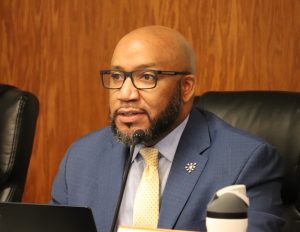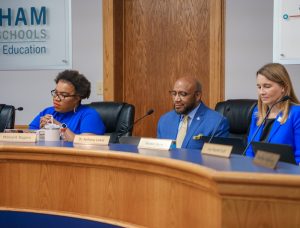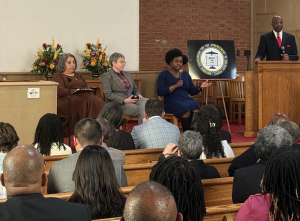With a sheaf of letters in hand, Ellen Holmes, a Spanish teacher at Jordan High School, stepped up to the lectern before the Durham board of education. Translating haltingly from parents’ letters at Thursday’s school board meeting, she spoke of DPS families’ fear and anxiety about the threat of federal law enforcement entering schools.
“I can only think of when the ICE agents will come to school for my daughter,” Holmes read from one parent’s letter. “The children need the right to be in school as a safe place, and we, as parents, deserve the right to go to school with our children to support them.”
DPS teachers, parents, and students showed up in full force at the meeting to express their fears about the potential presence of U.S. Immigration and Customs Enforcement (ICE) agents in schools.
Durham schools have not experienced any ICE raids or investigations so far, according to Crystal Roberts, a spokesperson for the school district (see full DPS statement below). But statewide, ICE arrests of immigrants have risen by nearly 170% this year. According to the Deportation Data Project, a data repository launched by scholars at the University of California-Berkeley, over a third of those arrested had no criminal convictions. A majority of them are Mexican.
That pressure is being felt in local schools, parents and teachers said Thursday, echoing comments made at a Sept. 11 work session.
“We have lost, just from last year, award-winning…college-bound, exemplary students. They’re just gone,” River Woodsworth, a teacher at Hillside High School, said at the Sept. 11 meeting, wringing his hands as he spoke. “And we don’t know what has happened to them.”
Woodsworth and others are seeking greater clarity on school district protocol for responding to potential ICE activity in the local schools. They are also urging the district to adopt stronger protections.
“We may not have the ability to change federal policy, but we can strengthen local policy to protect against some of the harms,” Fern Hickey, a DPS parent, said at the Sept. 11 meeting. The district has clear protocols for dealing with federal agents, but is limited in what it can share publicly, Roberts said.
“For the safety of our students and staff, we do have detailed procedures in place,” Roberts, the school district spokesperson, said in an emailed statement to The 9th Street Journal. “However, we cannot share every step of those procedures publicly. To do so could compromise their effectiveness and, ultimately, student safety.”
A group of teachers and parents is asking for a return to stronger policies that the district enacted in 2017, but which were later revised. Roberts said the district is looking closely at the issue of how to respond to federal agents.
“We have carefully considered a wide range of issues related to ICE inquiries and enforcement and have a detailed plan to vet warrants and ensure FERPA compliance, including a review of policy 5120, which is a priority that has been set by the Board of Education,” Roberts said.
Under the earlier 2017 policy, the superintendent was responsible for approving any requests from federal law enforcement to “gather information, interview [DPS] students or be allowed access to a school site,” according to the Durham Herald-Sun. The superintendent was also required to notify the school board of all ICE requests.
Translation services were provided for students and families with limited English skills who are questioned by law enforcement. In addition, all principals were required to report all federal warrants served at the school to the superintendent’s office.
But those policies were revised in Oct. 2020, and replaced with the current policy 5120. Now, any law enforcement officer with a warrant may detain students. There is no longer a requirement for translation services in the event that a student or family has limited English skills.
Now that translation services are no longer required, bilingual teachers often bear the responsibility of providing live interpretation alongside their teaching duties, teachers say.
According to Holmes, this ad hoc responsibility causes her and other bilingual teachers incredible stress. In her former position as a Spanish teacher at Riverside High School, she was asked to translate everything from parent-teacher conferences to interactions with school resource officers, she said.
“I had to call a parent and let them know their student was tased by an SRO officer,…or that they had threatened to take their own life and needed medical attention,” she said, describing these practices as “highly unprofessional and unfair” to teachers who were not certified interpreters.
Under the current policy, “a reasonable attempt” must be made to inform a student’s parent before law enforcement may question the student. If the questioning takes place at school, law enforcement officers should do so privately.
While the principal must be notified about the arrest, teachers have no means of verifying the warrant used by a law enforcement officer to arrest a student, Holly Hardin, a teacher at Lakewood Montessori Middle School, said.
“Current district policy does not adequately protect students’ due process rights…,” Hardin said. “As an educator, I know that I cannot do my job if students and families do not feel safe in our schools.”
Hardin and others would like clarification regarding what access federal law enforcement officers have to school buildings. The group also wants guarantees that school resource officers will not assist any federal law enforcement officers, said Jordan High School teacher Carlos Perez.
The group also advocates for the adoption of a “private zones” policy drafted by lawyers at the American Civil Liberties Union and the North Carolina Justice Center.
“Private zones” refers to non-public areas of school property or school-sponsored events, Perez said. That includes parking lots, bus stops, sporting events, meetings, dances, field trips, and more. His group would like to require federal law enforcement officers to have a judicial warrant before entering these zones.
A board committee will review the current district policy starting the week of Oct. 13, board member Jessica Carda-Auten said at Thursday’s meeting.
Meanwhile, DPS “will not allow immigration officers to enter non-public areas of a campus or access students without a valid judicial warrant confirmed by the Superintendent’s Office and legal counsel, and…will never release student information unless specifically required by such a warrant or court order,” Roberts said.
Woodsworth, the teacher, said multilingual learner enrollment at Hillside High School has declined significantly from last year. Attendance rates have also suffered, and multilingual parents are unwilling to attend school events, he said.
DPS freshman Yahir Pina Rangel said that while he is “proud to be [of] Mexican descent…in this great country,” he no longer knows if he feels safe at school. This summer, one of his best friends from school left the country with his family due to safety concerns.
“I’m really gonna miss all the memories we had in school and out of school, playing soccer with you, and being even soccer teammates,” Rangel said, speaking at the Sept. 11 meeting, his gaze fixed on the script before him. He paused. “That really hurt.”
In light of the concerns, the district is partnering with El Futuro, El Centro Hispano, and World Relief to host a series of “informal yet intimate conversations with families” beginning in October, Superintendent Anthony Lewis said Thursday.
“The district is committed to ensuring that every student and family is treated with care, dignity, and respect. Our schools are safe and welcome places where all students can focus on learning, growing, and reaching their full potential,” he said.
Luna Gomez, a student at Holt Elementary School, also spoke at Thursday’s meeting. Wearing a pastel pink headband, she stood just tall enough to look over the lectern, though she had to reach up and lower the microphone before speaking. She urged board members to strengthen protections for students like her by revising the current policy.
“Dr Anthony Lewis, members of the board, you talk about how you always love when students give you their opinion, and you say how students should feel safe,” she said. “Well, this is it.”
Tanya Wan




